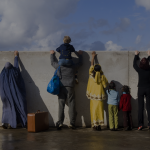MERJ- Migrants and Ethnic Minorities for Reproductive Justice is a grassroots movement by migrants and for migrants. The organisation was founded by women of colour who did not see themselves represented in the conversations surrounding the referendum. Women who saw Savita’s image being used in the campaign, yet no women who looked like Savita taking centre-stage.
As an organisation of migrants and ethnic minorities who were active in the Repeal the 8th campaign, we feel like the proposed legislation does not represent the best interest of our community. Our concerns include conscientious objection, waiting periods and abortion costs, as discussed by Health Minister Simon Harris following the results of the referendum.
The victory was a joyous moment to us all. Yet in the aftermath of the referendum, while everyone celebrated the victory, we knew the fight wasn’t over. Our members have the experience of different health systems where abortion is widely accessible, or where the three aforementioned issues are barriers in women’s access to abortion. We know what this legislation would mean and we know that the right to free, safe, legal abortion is harder to get in retrospect. Now is the time to claim the change we want to see and to protect the fair access to abortion for all.
In the case of conscientious objection, our Italian members can testify that legalising it would be a massive problem in accessing abortion. While abortion is legal in Italy, 70% of Italian gynecologists refuse to do it, a number that has grown since the legalisation of abortions in Italy. Doctors who initially performed abortions are now refusing to do it because they are pressured by the medical community, the eventuality of losing their jobs in Catholic-owned hospitals, or simply because their career now mainly focuses on this intervention. Although we have been dismissed when making this point during previous conversations in the campaign, MERJ would like to point out that the similarity between Italy and Ireland in terms of their Catholic background. Recently, Irish Catholic hospitals have declared that they will refuse to perform abortions and anti-choice doctors have declared that they would not even refer their patients to another specialist. There is no denying that conscientious objection is is dangerous.
As a point of contrast, in countries like Romania, where counscientious objection exists but it is not legal, the number of objectors is significantly lower. Their actions aren’t validated by the law so conscientious objection doesn’t pose a massive issue.
Regarding the 72 hours waiting periods, the dangers can be testified by MERJ members from countries like Germany, where these waiting periods are in place. Firstly, this legislation would be dangerous for women who are approaching the cut-off period. Secondly, when such a system exists, there is no way to control the existence of bias and stigma. The Together for Yes campaign has focused almost exclusively on compassion and care. This service would offer women no compassion and care, but it would merely continue telling women that they are not to be trusted with a decision, and must instead be questioned and forced to wait. It would not be much different from forcing a woman to make a case for herself in front of a panel of medics and judges, a system that we wish to leave behind.
Thirdly, we feel that any costs to abortions would affect anoyone who doesn’t have a certain financial status. And in a country with a massive housing crisis, it would be naive to deny that abortion costs would affect a significant number of the population. Not being able to afford healthcare in your country of residence is not much different from not being able to travel to England.
The migrant community would be disproportionately affected by these laws. In the case of a migrant woman on a low income or an asylum seeker in Direct Provision, this system would put an incredible financial strain on their already precarious situation. People in Direct Provision are tied by their medical card to a certain GP. If that GP is an objector, the pregnant person would have to travel to another doctor (given that their GP agrees to refer them to someone else), be told to wait for 72 to hours and thus arrange 4 trips in total or accommodation for 2 to 3 nights, and potentially pay for an abortion. All this on a budget of 21 euros a week. The same situation would apply to migrants with a low paid job, who don’t benefit from their family’s support system or are not able to take days off work.
MERJ believes that the aforementioned regulations would create an unequal system that goes against the principles this referendum was built on and against the messages of the grassroots movements whose tireless campaigning led to repealing the 8th. They would represent socio-economical barriers that would merely make women’s situation slightly better than it was before, instead of the change that was promised. Furthermore, they would be a breach of several human rights, including the right to personal integrity and privacy, the right to access timely and adequate healthcare, and the right to non-discrimination and equality. The intention behind repealing the 8th was precisely to create and protect these rights for pregnant people in Ireland.
We believe that the legislation is not in line with the progressive mentality promoted by Simon Harris and Leo Varadkar after the referendum, nor indeed with the results of the referendum where a majority of 66.4% voted for the legalisation of abortion, with a vast majority quoting a woman’s right to choose as the reason for their vote. Conscientious objection, waiting periods and the costs would put unnecessary barriers between women and their right to choose.
If the purpose of repealing the 8th was to eliminate the stigma and create better healthcare for pregnant people, these regulation do not belong in the legislation. A waiting period would reinforce the stigma and shame that were rightly condemned during the campaign. This would not be a system that actually trusts women. Nor does conscientious objection or abortion costs promote compassion and fair access to healthcare. This would still be a system that ostracises pregnant people, a system where they would still have to travel and access abortion according their financial privilege.
MERJ believes in free, safe and legal abortions that all pregnant people can access, whether they’re migrant, Irish citizens, middle-class, unemployed, or asylum seekers. Clarifications neet to be made to the legislation and everyone involved in its creation needs to considers the access to abortion and healthcare of pregnant people from all backgrounds. Unless they can guarantee that the three aspects mentioned above will not hinder the access of pregnant people to abortion, regardless of their background, these laws have no place in a progressive Ireland.
If we really want to talk about a progressive Ireland, any unnecessary barriers in the access to abortion must be removed. Waiting periods or conscientious objection have no scientific backup in reducing the numbers of abortions or benefiting pregnant people. These regulations are pandering to the same conservative Ireland we are so eager to get rid of and it is time to see these compromises for what they are: a harmful remnant of a Catholic/conservative ideology related to the sanctity of life and the condemnation of pregnancies that don’t happen on certain terms.





